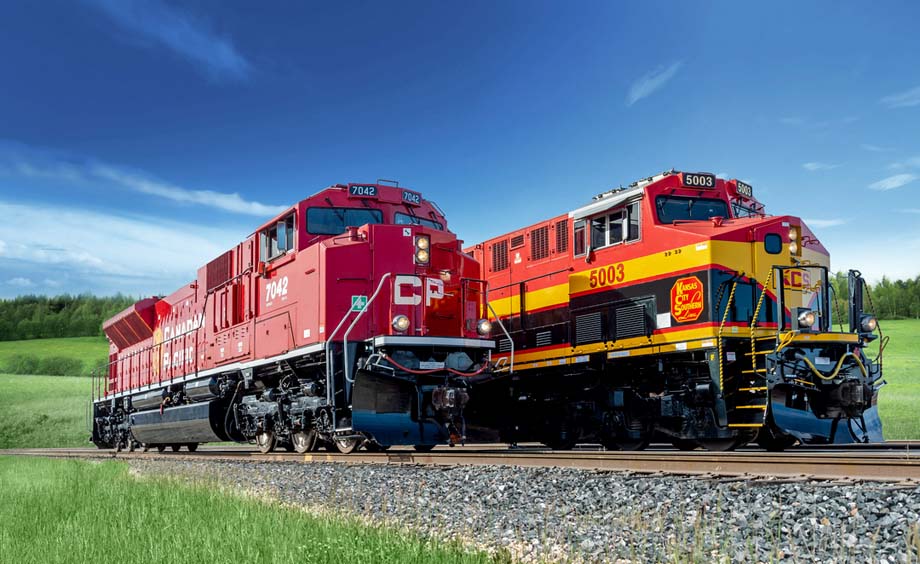
North America - Last year's merger of Canadian Pacific and Kansas City Southern, the two smallest
Class I systems, has turned out to be the little spark that has ignited a lot of railroad competition.
Skeptics have scoffed at CPKC's meandering route from the Midwest to the Mexican border at Laredo, Texas.
It's got more grades, more curves, more miles, and lower speed limits than the rival main lines of Union Pacific and
BNSF Railway.
Plus, CPKC doesn't control its own destiny.
It relies on trackage rights over UP between Beaumont and Rosenberg, Texas, on the western outskirts of oft-congested
Houston, and then again between Victoria and Robstown, Texas.
All this has prompted some observers to wisecrack that CPKC's route is the fourth best out of the three that connect
Chicago and Mexico.
Yet it seems that the other railroads are taking the underdog CPKC and its unique single-line service quite
seriously.
Just look at their responses to CPKC's Mexico Midwest Express premium intermodal service, which was launched in May
and links Chicago and Mexico with trucklike reliability and transit times.
Canadian National, Union Pacific, and Ferromex teamed up for Falcon Premium intermodal service.
The cross-border trains, launched the week after CPKC's MMX, connect CN's terminals in Canada and Detroit with points
in Mexico via Ferromex.
New UP CEO Jim Vena subsequently tightened the trains' schedules by a day when he arrived in Omaha in
August.
BNSF Railway and partner J.B. Hunt in December shifted their cross-border intermodal business away from CPKC's Laredo
gateway in favor of a Ferromex routing via Eagle Pass, Texas.
The new route is 24 hours faster.
In a move that will create a new interchange and interline service between the Southeast and Mexico, CPKC and CSX in
May announced that they will acquire and operate Genesee & Wyoming shortline Meridian & Bigbee.
The shortline fills the 148 mile gap between CPKC at Meridian, Mississippi, and CSX at Montgomery,
Alabama.
Union Pacific responded to this development by announcing new interline intermodal service linking points in Mexico
with CSX, Norfolk Southern, and Florida East Coast terminals in the Southeast via Memphis.
The service relies on rubber-tiring boxes between Memphis terminals, however, which is not ideal.
But it does give UP's intermodal customers a head start against the eventual CPKC-CSX service.
Other railroads have responded elsewhere, too.
CN and NS in September announced new interline service connecting CN's terminals in Canada with NS terminals in Kansas
City and Atlanta via steelwheel interchange at Detroit and Chicago.
CN had unsuccessfully sought access to Kansas City as part of its failed attempt to acquire KCS, and then later during
the CP-KCS merger review.
Also in September, CN began intermodal service linking Mexico with the Midwest and Canada in a partnership with
Crowley, whose container ships sail weekly between the Port of Mobile, Alabama, and Tuxpan, Mexico.
One rail executive says Class I railroads have hatched more interline deals in the past 10 months than they did in the
past 10 years.
The common thread among all these new joint services?
They could have been created years ago.
But railroads instead chose to sit on their duffs.
CPKC CEO Keith Creel chalks this up to human nature.
"When you're not challenged, and this is human nature, this is railroading nature, this is any business nature,
this is competitive sport nature, this is just a fact of life, sometimes complacency can set in," Creel told the
RailTrends conference in November.
"And this industry is in a place where we needed to be better. We need to be better for all stakeholders, not just
our own, but for this nation."
Creel's analysis is spot-on.
But there are two other reasons behind the recent uptick in interline deals.
First, CSX, NS, and UP all looked inward from 2017 through 2020 as they pruned interline service while adopting
Precision Scheduled Railroading.
The focus was on cutting, not adding, although there were exceptions, such as CSX-CN joint intermodal service linking
the ports of New York, New Jersey, and Philadelphia with Toronto and Montreal.
Second, railroad service has largely recovered from the widespread crew shortages that snarled traffic in 2022 and the
first half of 2023.
No railroad in its right mind would begin new service when it couldn't deliver.
CPKC has shaken up the industry.
Let's hope complacency is out, and more cooperation and competition are in.
Bill Stephens.
(likely no image with original article)
(usually because it's been seen before)
provisions in Section 29 of the
Canadian Copyright Modernization Act.
